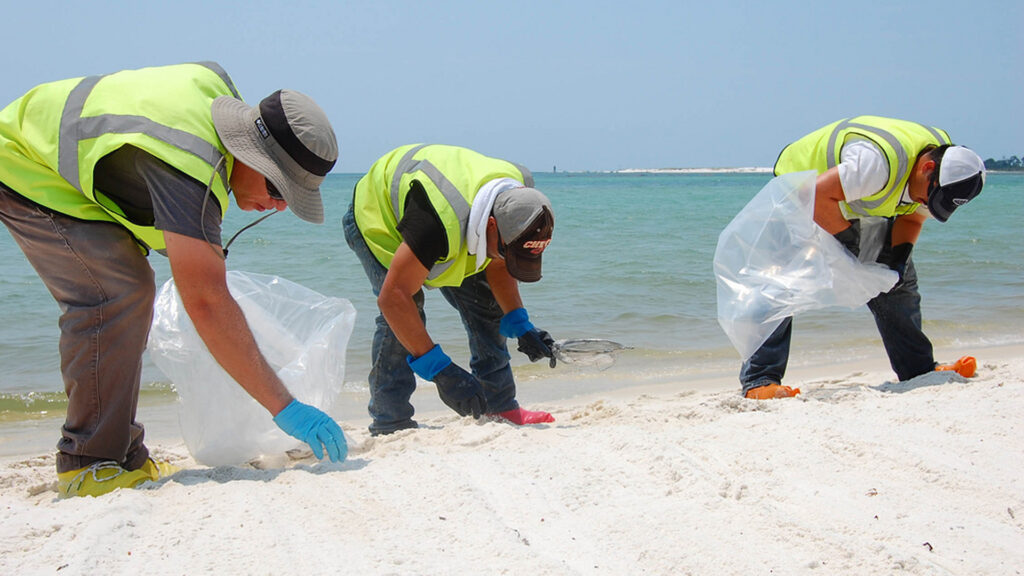By Daniel Moss, Defenders of Wildlife
If you live around the Gulf of Mexico, you already know the significance of April 20. It’s a date with lasting footprints on the beaches along our coast, from Florida to Texas. Fifteen years ago, an explosion blew apart the Deepwater Horizon drilling platform. Eleven people died, 134 million gallons of oil spewed into the ocean and a black eye was left on 1,300 miles of Gulf coastline across five states. The cascading effects were felt for years — and are still with us today.
This month, as the Trump administration chants “drill, baby, drill” under claims of a phantom national energy emergency, the ugly reality of the disaster comes to mind. The memory of that catastrophe — and its lingering associations with death, contamination and fear — reflects the grave threat expanded offshore drilling poses to many of the nation’s coastal communities today.

A 2012 study estimated that $4.9 billion in commercial fishing revenue was lost due to the disaster, along with another $3.5 billion from recreational fishing. Other estimates suggested that lost tourism dollars cost the Gulf Coast economy up to $22.7 billion through 2013. When the fish are all contaminated, there’s nothing to catch and sell. When a town relies on the health of its ocean for its economic heartbeat, an oil spill has the same impact as a meteor.
Not only human life was impacted. The ruptured Deepwater Horizon pipeline poured oil into Gulf waters unchecked for 87 days before it was capped. In those waters, no marine life went untouched. Deaths increased by 35% for bottlenose dolphins, and nearly all of the 21 species of dolphins and whales that live in the northern Gulf sustained injuries. Up to 173,000 sea turtles were killed. Birds, fish, oysters and ocean floor habitat all suffered massive losses and damage. Scientists estimate that the spill wiped out a whopping 20-22% of Rice’s whales, one of the most critically endangered whales in the world and the only great whale species known to reside year-round in the Gulf.
To put that into perspective, around 21.7% of Americans are under the age of 18. Imagine every one of them gone, and you get a sense of the scale of the impact of this disaster on the very existence of the Rice’s whale.
Today, the second Trump administration is aggressively promoting expanded offshore oil drilling and, via presidential executive order, seeks to roll back protections put in place by President Joe Biden to safeguard our coastal waters, marine life and communities from the pollution, disruption and harms associated with offshore oil and gas development. The administration’s energy agenda is supported by the majority in Congress, who are also pushing bills to “drill, baby, drill.” While additional drilling regulations were put in place to respond to the Deepwater Horizon spill, pro-oil industry members of Congress now conveniently forget that history.

Communities along our coasts remember it, though — the closed beaches, the billions of dollars lost to our fishing and tourism industries and economies, and the dead, oil-coated sea turtles, pelicans and dolphins. Those memories linger.
A 2021 study on the lasting impact of the Deepwater Horizon disaster focused not only on the physical damage but on the mental and psychological damage. Parents were afraid to take their children to Gulf beaches, even when waters were deemed safe. Shoppers bought less fish and seafood, even after Gulf fishing resumed and was approved safe for consumption. Pain lasts. Fear lasts.
Fifteen years later, the Trump administration proposes a future where coastal communities across America would be at risk of revisiting those devastating psychological and physical scars. But the Gulf Coast does not forget what blighted its shores 15 years ago and neither should Congress. Now, America must reject the threat of the next potential Deepwater Horizon and speak up for the health of our coastal communities and marine life. Silence is not an option when so much is at stake.
Daniel Moss is a senior government relations representative for Defenders of Wildlife. Moss leads Defenders’ federal advocacy to protect wildlife in a variety of diverse areas. This opinion piece was originally published by the Tampa Bay Times, which is a media partner of The Invading Sea.
Sign up for The Invading Sea newsletter by visiting here. To support The Invading Sea, click here to make a donation. If you are interested in submitting an opinion piece to The Invading Sea, email Editor Nathan Crabbe at ncrabbe@fau.edu.



